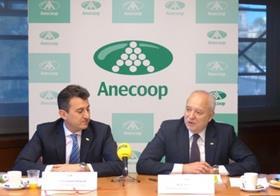
Anecoop's sales for the 2013/14 season fall by 8 per cent to €546.6m. The corresponding sales volume was down 3 per cent to 715,063 tonnes. Announcing the results at its annual general meeting in Valencia on Friday, the company said in spite of the fall, it had achieved its second best season after 2012/13.
With regard to the 2015 campaign, the company said it had so far seen sales rise by 7 per cent in volume and 6.2 per cent in value compared to the same period last year. The biggest growth this year has been in fruit, with volumes up 31.6 per cent year-on-year. The 2014/15 kaki season, which was recently concluded, saw sales rise by 19 per cent.
Joan Mir, Anecoop’s director general, said in spite of the challenging situation in many markets, the company had worked with enthusiasm to try and buck the trend and achieve a positive outcome for the company.
“The time has come to put our heads together and come up with innovative initiatives to grow the company and boost our members’ returns,” he stated.
Referring to the Russian ban, Mir said the effects were being felt more acutely this season than during the last year, when only the tail end of the stonefruit season was affected.
“As a result of the veto we are seeing financial instability, higher supplies across almost all markets and lower prices as a result,” he noted.
Amongst this season’s high points, Anecoop said it had recently completed the first full season of its extra early Clemensoon clementine variety, in which volumes had reached their highest growth for five years.
The company also pointed out that vegetable sales volumes had risen by 5 per cent, with virtually all vegetable lines showing an increase, while in fruit, peach, nectarine and plum sales were all down as a result of the Russian veto, although apricots bucked the trend and achieved better results than in 2012/13.
Anecoop brings together 71 Spanish fruit, vegetable and wine cooperatives and is the country’s biggest cooperative grouping.



